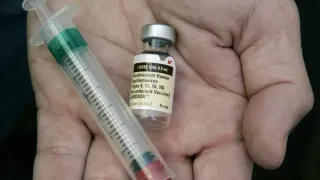
3 hours ago
President Trump's Contempt Shocks the Country's Largest Somali Community
Tim Sullivan READ TIME: 3 MIN.
Even for a president who has long made clear he’s no fan of Somalia, the latest round of White House contempt was a shock Wednesday in the country’s largest Somali community.
“They contribute nothing. I don’t want them in our country,” President Donald Trump told reporters during a Tuesday Cabinet meeting. “We can go one way or the other, and we’re going to go the wrong way if we keep taking in garbage into our country.”
On Wednesday, he doubled down: “Somalians should be out of here,” he told reporters during an Oval Office event. “They’ve destroyed our country.”
As for Minneapolis Mayor Jacob Frey, who has repeatedly criticized the president's rhetoric, Trump dismissed him as a “fool.”
“I wouldn’t be proud to have the largest Somali population,” in the U.S., he said.
Hamse Warfa, a Somali-born entrepreneur who now lives in the Minneapolis area, sees things differently.
“I am not garbage,” said Warfa, who has started a series of successful businesses and now runs a nationwide education nonprofit, World Savvy. "I’m a proud American citizen."
He notes that anti-immigration rhetoric has long been a powerful political tool, such as the Haitian migrants in Ohio who Trump vilified ahead of the 2024 elections.
“Last presidential election it was the Haitians and how they eat cats and dogs,” he said. “The next iteration now is Somalis.”
The Minneapolis-St. Paul area is home to about 84,000 people of Somali descent, who make up nearly one-third of the Somalis living in the U.S.
Trump made his comments Tuesday soon after reports that federal authorities are preparing a targeted immigration enforcement operation in Minnesota focusing on Somalis living illegally in the U.S., according to a person familiar with the planning. But most of the state’s Somalis are U.S. citizens, many born in this country.
Some Somali leaders said Wednesday they had received anecdotal reports about community members being detained by federal agents, but had no details. Federal immigration officials did not immediately respond to requests for comment.
Refugees from the East African nation have been coming to the frigid plains of Minnesota since the 1990s, drawn in part by the state’s generous social services and then by the ever-growing diaspora community.
They have become fixtures in the Twin Cities, opening businesses and revitalizing neighborhoods of empty storefronts. They are also increasingly politically prominent, serving in the state Legislature and on the Minneapolis and St. Paul city councils. Democratic Rep. Ilhan Omar — a regular target of Trump, who on Tuesday singled her out as “garbage” — serves in the U.S. House.
Over the past few years they have also struggled with being typecast after dozens of people, many of them Somalis, were arrested in connection with schemes to defraud social service agencies of what some officials say could total hundreds of millions of dollars. Many of the arrested Somalis are U.S. citizens.
Last week, Trump called Minnesota “a hub of fraudulent money laundering activity” after a report by a conservative activist said fraud money flowed to the militant group al-Shabab, an affiliate of al-Qaida that controls parts of Somalia. But there has been little, if any, evidence, showing such a link, and federal prosecutors have not charged any defendants with supporting terrorists.
Trump's recent comments also came days after his administration announced it was halting all asylum decisions following the shooting of two National Guard soldiers in Washington. The suspect is originally from Afghanistan but Trump has raised questions about immigrants from other nations, including Somalia.
Also Tuesday, the administration said it was pausing all immigration applications for people from 19 countries, including Somalia, that were banned from travel to the U.S. after the National Guard shooting.
Somali leaders and allies like Gov. Tim Walz and Frey have vowed to protect the community.
“Minneapolis is — and will remain — a city that stands up for our residents,” Frey said in a statement.
Several Democratic legislators and Minneapolis City Council members held a news conference Wednesday to reinforce that message.
They called on Republican lawmakers to denounce the president’s attacks, saying history will judge them.
“Where are the Republicans now?” asked state Sen. Zaynab Mohamed, of Minneapolis, who said she had urged Republican political leaders to attend the news conference.
As for Warfa, he just wishes the rhetoric would die down. One of his daughters is a high school senior mulling her next steps.
“I would rather spend time with my daughter thinking about college, and taking her to different college tours,” he said, instead of being “spoken about as garbage, you know, by the president of the United States.”






